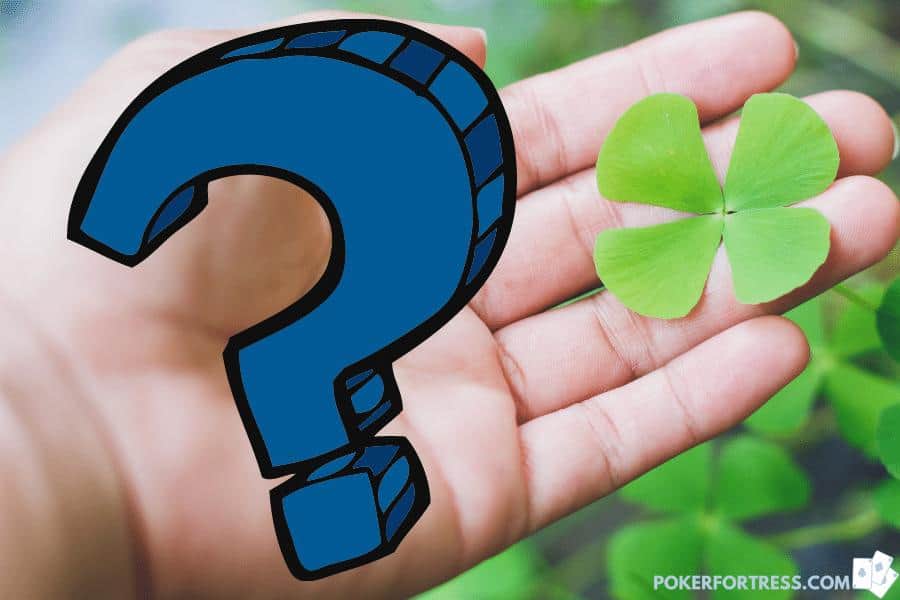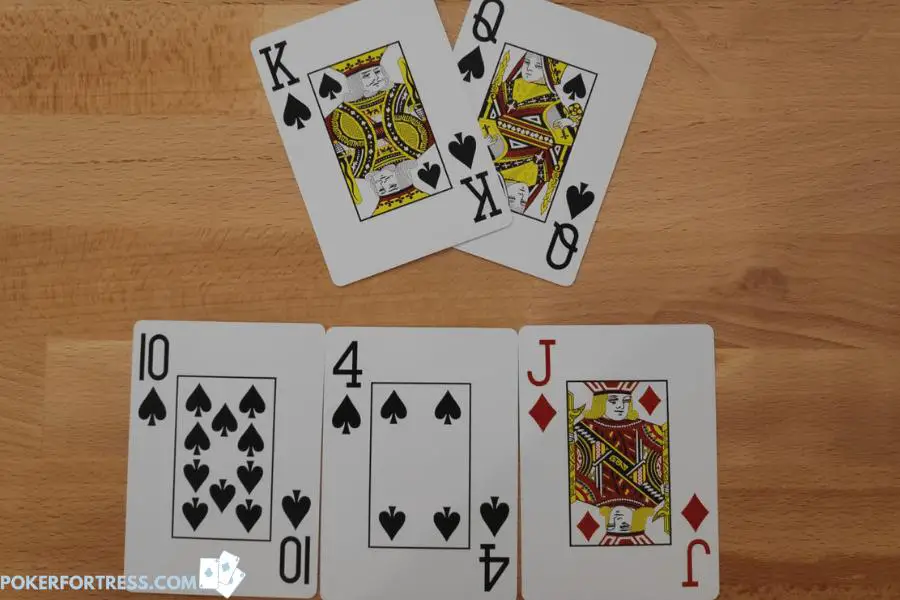If you’ve watched live tournaments, you’ve seen many skilled players using weak hands to crush their opponents. It takes a lot of skills to win a poker game, but we can’t deny that luck plays a significant part in it. The question is, how much can your luck affect a poker game?
It takes luck and skills to win tournaments, but we can’t put an exact percentage on how much they can affect games. That’s because even the nuts won’t guarantee massive pots, and the best players go down with bad luck. However, you can calculate your odds of winning by using math and probability.
The level of ambiguity in poker makes people think that it’s more of a game of luck than skills. However, if you’re planning to participate in the next WSOP just because you’re feeling lucky, you better stick around. We’ll discuss this in great detail to help you understand how much luck can affect your games.

The Impact of Luck vs. Skills in Poker
The lottery is an example of a game that solely depends on luck. Chess is a game that puts the most skilled player on the pedestal. You know this because there’s no such thing as the “best lottery player” and the “luckiest chess player.”
Just like in poker, also in chess, a worse opponent can win a single game. But after many games, a more skilled player will prevail. Both, chess and poker, take a lot of practice and learning to be good at, but which is harder to be great at? If you are interested to know whether chess or poker is harder to master, then read my detailed article about it here.
If you’re playing the lottery, you can’t do anything to guarantee a win—that’s 100% luck. When playing chess, you must calculate every move that your opponent makes to win—that’s 100% skills. You still do some mistakes and a worse player can get lucky and win. It takes very little games to see who is the better player though.
It’s different with poker, though, because even Daniel Negreanu talks about the most skilled players going through a losing streak because of bad luck.
Even Negreanu, #3 in the all-time money list and one of the best poker players ever, believes that bad luck can affect poker games. However, of all the five reasons, only one has to do with luck. The other three depend on your skills as a player, and the last one is your emotional capacity.
If we’re only going to use Negreanu’s assessment, which we should, as a basis for the percentage of luck in poker, we can say that it only accounts for 20% of the game. The remaining 80% depends on how much you understand and scale yourself as a poker player.
Hot hands, especially when you have plenty, can be enough to win tournaments. This video shows you how it can happen, but it’s something that you shouldn’t rely on when playing. One reason why poker has become a popular card game is that many people think they can play.
The problem is that most of them believe that luck plays a significant role in winning, making it easier for experienced players to crush them.
The Math and Probability of Poker
Indeed, you can’t put an exact percentage on how much luck can affect your games. However, there’s a more accurate way of calculating your odds of winning—math and probability.
It’s the most accurate way to calculate your chances, and even professional players rely on math and probability when making their decisions. The easiest way for you to do it is to familiarize yourself with poker outs.
Out refers to the number of cards a player needs to complete a hand. 1 out means that a player only has one chance out of all the cards remaining in the deck to complete his hand. The more outs there are, the higher the percentage that a player could win the game. It still depends on luck, but there’s an exact percentage to it.
Professional poker players use math when making decisions because it doesn’t rely on uncertainty, such as gut feeling or luck. If you want to make sound decisions, it would be better to familiarize yourself with poker outs. Here’s a table to help you see why it’s more reliable than using luck as a basis for all of your decisions:
Poker Outs to Odds
| Outs | Turn Odds | River Odds | Combined Odds |
| 1 Out | 45.9:1 (2.13%) | 45.1:1 (2.17%) | 22.3:1 (4.26%) |
| 2 Outs | 22.5:1 (4.26%) | 22.0:1 (4.35%) | 10.9:1 (8.42%) |
| 3 Outs | 14.7:1 (6.38%) | 14.3:1 (6.52%) | 7.0:1 (12.49%) |
| 4 Outs | 10.8:1 (8.51%) | 10.5:1 (8.70%) | 5.1:1 (16.47%) |
| 5 Outs | 8.4:1 (10.64%) | 8.2:1 (10.87%) | 3.9:1 (20.35%) |
| 6 Outs | 6.8:1 (12.77%) | 6.7:1 (13.04%) | 3.2:1 (24.14%) |
| 7 Outs | 5.7:1 (14.89%) | 5.6:1 (15.22%) | 2.6:1 (27.84%) |
| 8 Outs | 4.9:1 (17.02%) | 4.8:1 (17.39%) | 2.2:1 (31.45%) |
| 9 Outs | 4.2:1 (19.15%) | 4.1:1 (19.57%) | 1.9:1 (34.97%) |
| 10 Outs | 3.7:1 (21.28%) | 3.6:1 (21.74%) | 1.6:1 (38.39%) |
| 11 Outs | 3.3:1 (23.40%) | 3.2:1 (23.91%) | 1.4:1 (41.72%) |
| 12 Outs | 2.9:1 (25.53%) | 2.8:1 (26.09%) | 1.2:1 (44.96%) |
| 13 Outs | 2.6:1 (27.66%) | 2.5:1 (28.26%) | 1.1:1 (48.10%) |
| 14 Outs | 2.4:1 (29.79%) | 2.3:1 (30.43%) | 0.95:1 (51.16%) |
| 15 Outs | 2.1:1 (31.91%) | 2.1:1 (32.61%) | 0.85:1 (54.12%) |
| 16 Outs | 1.9:1 (34.04%) | 1.9:1 (34.78%) | 0.75:1 (56.98%) |
| 17 Outs | 1.8:1 (36.17%) | 1.7:1 (36.96%) | 0.67:1 (59.76%) |
| 18 Outs | 1.6:1 (38.30%) | 1.6:1 (39.13%) | 0.60:1 (62.44%) |
| 19 Outs | 1.5:1 (40.43%) | 1.4:1 (41.30%) | 0.54:1 (65.03%) |
| 20 Outs | 1.3:1 (42.55%) | 1.3:1 (43.48%) | 0.48:1 (67.53%) |
| 21 Outs | 1.2:1 (44.68%) | 1.2:1 (45.65%) | 0.43:1 (69.94%) |
| 22 Outs | 1.1:1 (46.81%) | 1.1:1 (47.83%) | 0.38:1 (72.25%) |
Here’s one of the best examples that will help you understand outs:
- Your hand is K♠ Q♠
- The flop is 10♠ 4♠ J♦

With these cards, you have an open straight and a flush draw. The cards that will complete your hand are as follows:
- 9 any suit
- A any suit
- 2♠ & 3♠
- 5♠ to 8♠
- J♠
In this scenario, you’re looking for 15 cards of all the cards remaining on the deck. That gives you 31.91% to hit the card you need by the turn, and 32.61% by the river (around 32% twice by the river). It’s a very high percentage, so even without relying on luck, you know that you should play post-flop.
If you’re playing with only one out, and there’s an action post-flop, it makes more sense to throw your cards to the muck. One out has a ratio of 45.9:1 by the turn and only 45.1:1 by the river. Combined, you only have one chance out of 22.3 cards to complete your hand. Statistically, there’s no chance for you to win against someone who has 15 outs unless luck intervenes.
You can hope for a lucky draw, but if you’re going to make your decisions based on luck, it goes way beyond what you can control.
Remember, a good poker player focuses on the things that he can control.
Luck has a significant impact on winning or losing games, but it takes massive skills to win WSOP bracelets. Even with Dan Smith’s lucky streak, he still used math and probability to make his decisions.
All poker players believe in luck because there’s a high level of ambiguity in every game. However, it’s not something that we can control—there’s no such thing as improving your luck in poker, but you can play for hours every day to improve your skills.
In fact, if you ask Phil Ivey what it took to win 10 WSOP bracelets, he’ll tell you one thing—he played more than any other poker player in the world. It’s what made him a better player. If there’s one thing that separates a mediocre and a world-class poker player, that’s how much they believe in luck.
Conclusion
We can’t deny that luck will always have a massive impact on poker—even professional players know it. However, it’s impossible to put an exact number to it because it’s beyond what any player, or dealer, can control. That’s why the most common advice that you’ll get from coaches is to play more hands and get better with the game.
Poker is a game of theories and maths, you can calculate the odds that a card will come out, but you can’t put a number on luck. It would be best to make decisions based on the odds that your hand has, instead of relying on luck to win poker games. It’s too unpredictable and unreliable for you to be using it as part of your strategy.




